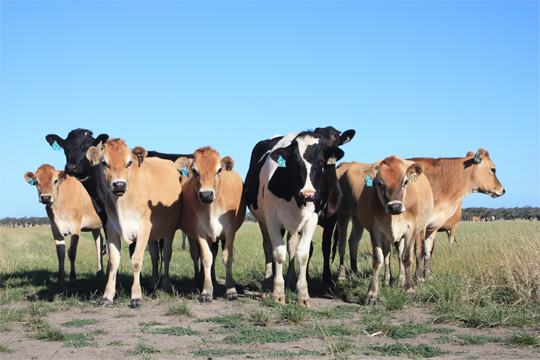
Reducing Food Waste in Foodservice
October 16, 2018 by Doreen Garelick, Dietetic Intern
Our intern Doreen attended a food waste summit for restaurants and compiled these tips to help food service operators redirect…
News Commentary, Scientific Committee
October 7, 2013

The Cows are Coming Home to Roost for America’s Industrial Meat Industry
The past few weeks have featured a wave of scientific reports about the impact of meat production on our health and the health of the planet.
On September 17, the Centers for Disease Control and Prevention found that at least 23,000 people die annually from antibiotic resistant infections that also sicken two million people each year. The intensive use of antibiotics in livestock production is one of the two main causes. A day before, the Journal of the American Medical Association published two studies that showed individuals living near big pork production facilities face significantly increased risk of being infected with an antibiotic resistant superbug, a form of the MSRA bacteria.
Using large amounts of antibiotics, including giving drugs to healthy animals, is a key part of the industrial livestock industry. That nontherapeutic use prevents the spread of disease among animals confined together in small spaces and unnatural conditions and also boosts production. About three quarters of all antibiotics used in the US are now given to animals.
Ten days later, the United Nations Intergovernmental Panel on Climate Change reported that livestock production alone accounted for 14.5% of all emissions including about 3.4% of the world’s total greenhouse gas emissions coming from US livestock operations. The UN also found that adopting better livestock production practices could cut that amount by 30%.
The changes that help the planet and keep us healthy are the same: raise fewer cows using better practices. For restaurants and foodservice operators of all sizes this means serving smaller amounts of higher quality meat, including animals raised in natural conditions and given antibiotics only when they are sick.
Many have decided to act, committing to using better meat and phasing out the use of meat produced by given antibiotics to healthy animals. SPE certification requires this same approach, which also drives better nutrition.
Unfortunately, just as more foodservice establishments, including those certified by SPE, are making the move to less, better meat, the cows, or at least the impact of industrial meat production, are now coming home to roost.
Climate change, driven in large part by meat production, is also hurting the livestock industry. The number of cattle in the US is now at a sixty year low. Higher costs, largely driven by record drought, less water for cattle and to grow the key crops used to feed animals, have led ranchers to shrink their herds. Reversing either is not a short-term proposition.
Meat prices are now forecast to remain at record highs while less meat is produced. The pressure isn’t just limited on industrial livestock. Rangeland and hayfields also are affected by the drought. Livestock producers using better production methods such as avoiding antibiotics and allowing animals to graze and forage, also are having to reduce herd sizes.
This has led to a shortage of more sustainable meat and has affected many companies committed to smaller portions of more sustainably-raised meat. Among the most visible is Chipotle, who simply can’t find enough to meet its needs.
SPE requires certified restaurants and foodservice companies to both limit servings of meat and also commit to using meat made without the use of nontherapeutic antibiotics. At a time when meat of all kinds is in short supply, we recognize that finding better meat is a significant challenge.
This means that for SPE certified foodservice establishments, as well as others, the biggest contribution to health and sustainability is to reduce the amount of meat served now and maintain a commitment to phase out meat produced by giving antibiotics to healthy animals over the next several years. Doing so continues to signal the livestock industry to head in a better direction even as it works to solve problems of its own making.

October 16, 2018 by Doreen Garelick, Dietetic Intern
Our intern Doreen attended a food waste summit for restaurants and compiled these tips to help food service operators redirect food waste from landfills.
Nutrition 101

Nutrition 101
September 26, 2018 by Doreen Garelick, Dietetic Intern
Ever notice headlines about rapid weightloss? Dietetic Intern Doreen Garelick looks deeper into a recent eye-catching headline to see if there's any truth behind it.
Connect
 Follow us on Twitter
Follow us on Twitter Friend us on Facebook
Friend us on Facebook Follow us on Pinterest
Follow us on Pinterest Follow us on Instagram
Follow us on Instagram Read our Blog
Read our Blog Watch videos on YouTube
Watch videos on YouTube Watch videos on Vimeo
Watch videos on Vimeo Connect with us on Linkedin
Connect with us on Linkedin Find us on Foursquare
Find us on Foursquare
Tweets by @SPEcertifiedBlog Search
Categories
SPE Certified Newsletter
Sign up for news on the latest SPE-certified venues, events and SPE updates.
We will never share your personal information with a third party.